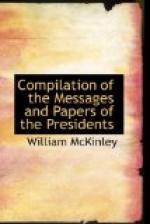In Cuba such progress has been made toward putting the independent government of the island upon a firm footing that before the present session of the Congress closes this will be an accomplished fact. Cuba will then start as her own mistress; and to the beautiful Queen of the Antilles, as she unfolds this new page of her destiny, we extend our heartiest greetings and good wishes. Elsewhere I have discussed the question of reciprocity. In the case of Cuba, however, there are weighty reasons of morality and of national interest why the policy should be held to have a peculiar application, and I most earnestly ask your attention to the wisdom, indeed to the vital need, of providing for a substantial reduction in the tariff duties on Cuban imports into the United States. Cuba has in her constitution affirmed what we desired, that she should stand, in international matters, in closer and more friendly relations with us than with any other power; and we are bound by every consideration of honor and expediency to pass commercial measures in the interest of her material well-being.
In the Philippines our problem is larger. They are very rich tropical islands, inhabited by many varying tribes, representing widely different stages of progress toward civilization. Our earnest effort is to help these people upward along the stony and difficult path that leads to self-government. We hope to make our administration of the islands honorable to our Nation by making it of the highest benefit to the Filipinos themselves; and as an earnest of what we intend to do, we point to what we have done. Already a greater measure of material prosperity and of governmental honesty and efficiency has been attained in the Philippines than ever before in their history.
It is no light task for a nation to achieve the temperamental qualities without which the institutions of free government are but an empty mockery. Our people are now successfully governing themselves, because for more than a thousand years they have been slowly fitting themselves, sometimes consciously, sometimes unconsciously, toward this end. What has taken us thirty generations to achieve, we cannot expect to see another race accomplish out of hand, especially when large portions of that race start very far behind the point which our ancestors had reached even thirty generations ago. In dealing with the Philippine people we must show both patience and strength, forbearance and steadfast resolution. Our aim is high. We do not desire to do for the islanders merely what has elsewhere been done for tropic peoples by even the best foreign governments. We hope to do for them what has never before been done for any people of the tropics—to make them fit for self-government after the fashion of the really free nations.




